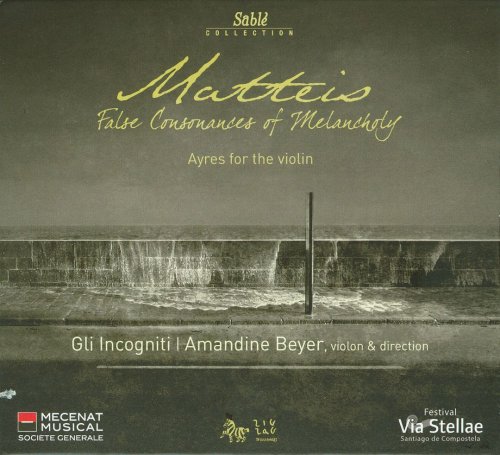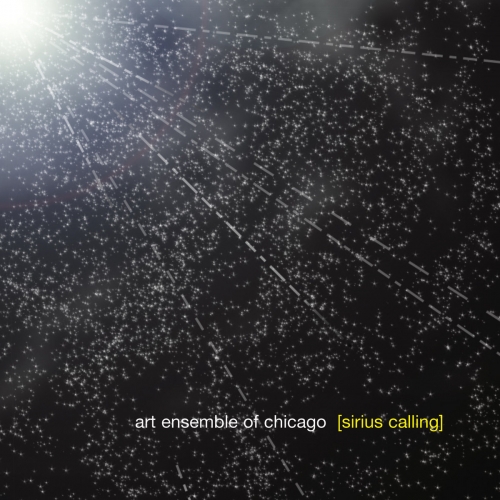Gli Incogniti, Amandine Beyer - Nicola Matteis: False Consonances of Melancholy (2009) Hi-Res

Artist: Gli Incogniti, Amandine Beyer
Title: Nicola Matteis: False Consonances of Melancholy
Year Of Release: 2009
Label: Linn Records
Genre: Classical
Quality: FLAC (tracks) 24/96
Total Time: 01:12:26
Total Size: 1,47 Gb
WebSite: Album Preview
Tracklist: Title: Nicola Matteis: False Consonances of Melancholy
Year Of Release: 2009
Label: Linn Records
Genre: Classical
Quality: FLAC (tracks) 24/96
Total Time: 01:12:26
Total Size: 1,47 Gb
WebSite: Album Preview
1. Sonata (Adagio) (2:03)
2. Diverse bizzarrie Sopra la Vecchia Sarabanda o pur Ciaccona (4:13)
3. Passaggio rotto. Andamento Veloce (2:14)
4. Fantasia (1:42)
5. Preludio in fantasia (1:16)
6. Allegro (2:01)
7. Aria malinconica (Adagio) (2:25)
8. Giga (Allegro) (0:40)
9. Aria Amorosa (3:23)
10. Aria (1:21)
11. Preludio (1:25)
12. Musica (Grave-Presto) (1:42)
13. Sarabanda (Adagio) (2:37)
14. Aria (1:10)
15. Aria burlesca (Presto) (1:57)
16. Fuga (Prestissimo) (1:07)
17. Giga. Al Genio Turchesco (0:57)
18. Preludio (0:51)
19. Adagio (2:11)
20. Allemanda ad imitatione d'un tartaglia (1:36)
21. Movimento incognito (4:05)
22. Sarabanda Amorosa (Adagio) (1:33)
23. Gavotta (Presto) (1:49)
24. Preludio. Presto (1:41)
25. Pavana Armoniosa (2:00)
26. Il Russignolo (1:17)
27. Preludio Allegro (Prestissimo). Malinconico (Adagio) (1:18)
28. Aria (Adagio-Presto) (1:25)
29. Vivace. Eco (2:18)
30. Fuga (Presto) (1:43)
31. Preludio (Adagio) (1:30)
32. Prestissimo (0:35)
33. Un poco di maniera Italiana. Aria Ridicola (Presto) (1:25)
34. Aria (1:32)
35. Fantasia (1:37)
36. Preludio in ostinatione. Passagio rotto (1:09)
37. Andamento malinconico. Divisone ad libitum (2:42)
38. Grave. (Adagio) (2:04)
39. Aria for the Flute (1:15)
40. Giga (1:47)
Performers:
Gli Incogniti
Amandine Beyer, Violin & Direction
The Sablé festival, held annually in Sablé-sur-Sarthe in France, has its own recording concern that it uses primarily to expose young early music artists and to support the most interesting of their projects; the Zig-Zag Territoires label provides an outlet for this endeavor. Here is a wholly worthy enterprise: the group Gli Incogniti -- led by the fabulous young violinist Amandine Beyer -- in a program drawn from various works of mysterious late seventeenth-century violinist Nicola Matteis, its title, False Consonances of Melancholy, fashioned after one of his publications, but not limited to its contents. As Matteis is not a household name, some summary of his place in the scheme of things is not out of order here: born in Naples, possibly contemporary to Heinrich von Biber, Matteis was an itinerant musician in Germany before making his way to London about 1670. He rose over time to become one of the principal violinists in England, noted for his facility as an improviser, the excellence of his compositions, and his rather coarse and uncivilized manner. While he had many private students, Matteis never gained any privilege at court and may not have cared to hold one down; his son, also named Nicola Matteis, would do so in Vienna starting in 1700 and enjoyed a far more stable and conventional career pattern. The elder Matteis seems to have died around the time his son left for Vienna and is known to posterity from seven published volumes appearing from between 1676 through 1703, two consisting of songs and one republished in a radically changed version, presumably after Matteis' death, and a scattering of music in manuscript sources.
Stylistically, Matteis falls somewhere in between Biber and Locke; while the music bears numerous harmonic eccentricities and a representational slant reminiscent of Biber, it also betrays the influence of English style and texture, particularly in regard to the handling of melody. Like Biber, Italian style is a key component in Matteis' music, but it is of an altogether older manner than the Corellian attitude practiced by Matteis' son, at times hearkening back even to the "bizzarries" of Biagio Marini. Needless to say, to an early music violinist all of these elements are strongly attractive combination, and Beyer makes the most of it, delivering a crisp and confident rendering of Matteis with an attentive and richly sonorous continuo provided by gambist Baldomero Barciela, guitarist/theorbists Ronaldo Lopes and Francesco Romano, and harpsichordist Anna Fontana. It's a long program, consisting of no less than 40 movements' altogether, and this relates to this release's only drawback. Many to most of Matteis' often very short pieces come bundled up into suites, and Gli Incogniti has elected to pick from Matteis' whole instrumental repertoire and add movements from elsewhere into sets that have already established contents. But it's hard to tell what's what, as the Zig Zag Territoires release is only partly forthcoming as to the provenance of the works included. It is not through idle curiosity that the listener would desire to really know what he/she is listening to; while there's nothing wrong with mixing and matching movements, to do so without indicating what comes from where seems a tad irresponsible, or at least short-sighted. Apart from that, Zig Zag Territoires' Nicola Matteis: False Consonances of Melancholy is a wholly enjoyable, well-played excursion through Matteis' music; from the standpoint of sheer playing, its aim is true and it hits the bull's-eye.
Stylistically, Matteis falls somewhere in between Biber and Locke; while the music bears numerous harmonic eccentricities and a representational slant reminiscent of Biber, it also betrays the influence of English style and texture, particularly in regard to the handling of melody. Like Biber, Italian style is a key component in Matteis' music, but it is of an altogether older manner than the Corellian attitude practiced by Matteis' son, at times hearkening back even to the "bizzarries" of Biagio Marini. Needless to say, to an early music violinist all of these elements are strongly attractive combination, and Beyer makes the most of it, delivering a crisp and confident rendering of Matteis with an attentive and richly sonorous continuo provided by gambist Baldomero Barciela, guitarist/theorbists Ronaldo Lopes and Francesco Romano, and harpsichordist Anna Fontana. It's a long program, consisting of no less than 40 movements' altogether, and this relates to this release's only drawback. Many to most of Matteis' often very short pieces come bundled up into suites, and Gli Incogniti has elected to pick from Matteis' whole instrumental repertoire and add movements from elsewhere into sets that have already established contents. But it's hard to tell what's what, as the Zig Zag Territoires release is only partly forthcoming as to the provenance of the works included. It is not through idle curiosity that the listener would desire to really know what he/she is listening to; while there's nothing wrong with mixing and matching movements, to do so without indicating what comes from where seems a tad irresponsible, or at least short-sighted. Apart from that, Zig Zag Territoires' Nicola Matteis: False Consonances of Melancholy is a wholly enjoyable, well-played excursion through Matteis' music; from the standpoint of sheer playing, its aim is true and it hits the bull's-eye.








![Belmondo Quintet - InfinityLive (2009) [CDRip] Belmondo Quintet - InfinityLive (2009) [CDRip]](https://www.dibpic.com/uploads/posts/2026-01/1768302788_5.jpg)